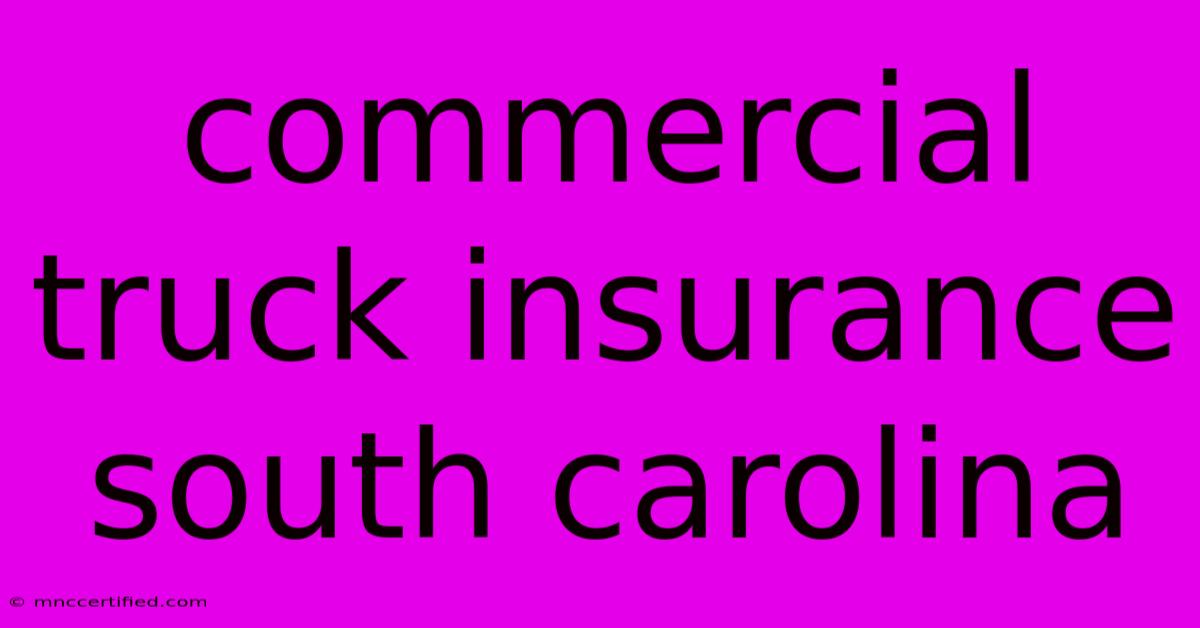Commercial Truck Insurance South Carolina

Table of Contents
Navigating the Roads of South Carolina: A Guide to Commercial Truck Insurance
Owning and operating a commercial truck in South Carolina means more than just navigating the state's beautiful highways and scenic byways. It also requires careful consideration of commercial truck insurance, a vital safety net protecting your business from financial ruin in case of accidents or other unforeseen events.
This comprehensive guide will demystify the intricacies of commercial truck insurance in South Carolina, providing you with the information needed to make informed decisions and ensure your business is adequately protected.
Understanding the Essentials of Commercial Truck Insurance
Commercial truck insurance differs significantly from standard auto insurance, as it caters to the specific needs of businesses operating large vehicles for commercial purposes. Here's a breakdown of the key components:
- Liability Coverage: This is a cornerstone of commercial truck insurance, providing financial protection against claims arising from accidents involving your truck, such as bodily injury or property damage to others.
- Cargo Coverage: Protecting your valuable cargo is essential. Cargo insurance covers the cost of lost or damaged goods while in transit, shielding your business from financial losses due to unforeseen events.
- Physical Damage Coverage: This component covers repairs or replacement costs for your commercial truck in the event of accidents, theft, or other incidents that cause damage.
- Uninsured/Underinsured Motorist Coverage: This safeguards your business from financial losses in case of an accident involving a driver who is uninsured or underinsured.
Navigating South Carolina's Specific Requirements
South Carolina has specific insurance requirements for commercial trucks, ensuring all drivers are adequately covered. Here are some key points to note:
- Minimum Liability Coverage: South Carolina requires all commercial trucks to maintain a minimum liability insurance coverage of $30,000 per person/$60,000 per accident for bodily injury and $25,000 for property damage.
- Financial Responsibility Law: This law mandates commercial truck operators to prove financial responsibility for potential accidents, typically through insurance or surety bonds.
Factors Influencing Commercial Truck Insurance Premiums
Numerous factors can influence your commercial truck insurance premiums, impacting the cost of coverage:
- Type of Truck: The size, weight, and type of your commercial truck play a significant role. Larger trucks with higher capacities generally carry higher premiums.
- Driving Record: Your driving history, including accidents and violations, directly affects your insurance rates.
- Cargo Type: The type of cargo you transport can influence your premium. High-value or hazardous materials often require additional coverage and, therefore, higher rates.
- Driving Area: The geographic area where you operate your truck can impact your insurance costs. Higher traffic density and increased accident risks in urban areas typically lead to higher premiums.
- Safety Features: Trucks equipped with advanced safety features, such as anti-lock brakes and lane departure warnings, can qualify for lower premiums.
- Years of Experience: Drivers with more experience often benefit from lower insurance rates, as their track record suggests a lower risk profile.
Securing the Right Commercial Truck Insurance in South Carolina
Obtaining the appropriate commercial truck insurance is crucial for your business's success. Here's a comprehensive guide:
- Compare Quotes: Request quotes from multiple reputable insurance providers specializing in commercial truck insurance.
- Understand Coverage Details: Carefully review policy details, including coverage limits, deductibles, and exclusions, to ensure they meet your specific needs.
- Assess Your Risk: Accurately assess your business's risk profile, considering factors like driving history, cargo type, and operating area, to determine the appropriate level of coverage.
- Shop for Discounts: Inquire about potential discounts, such as those for safety training, defensive driving courses, or multiple truck coverage.
- Consult an Insurance Agent: Seeking guidance from an experienced insurance agent specializing in commercial truck insurance can provide invaluable support in navigating the complex world of insurance options.
Conclusion: Protecting Your Business with Commercial Truck Insurance
Securing the right commercial truck insurance is essential for every trucking business in South Carolina. By understanding the intricacies of coverage options, South Carolina's specific requirements, and the factors influencing premiums, you can make informed decisions that protect your business from financial hardship and allow you to focus on what matters most: keeping your business running smoothly and efficiently.

Thank you for visiting our website wich cover about Commercial Truck Insurance South Carolina. We hope the information provided has been useful to you. Feel free to contact us if you have any questions or need further assistance. See you next time and dont miss to bookmark.
Featured Posts
-
Champions League Bayern Munich Vs Benfica Live
Nov 07, 2024
-
Lakers Fall To Grizzlies Morant Injury Update
Nov 07, 2024
-
Can You Get Title Insurance After Closing
Nov 07, 2024
-
Ukraine Seeks Trumps Strength Amid Uncertainty
Nov 07, 2024
-
Varicose Vein Removal Covered By Insurance
Nov 07, 2024